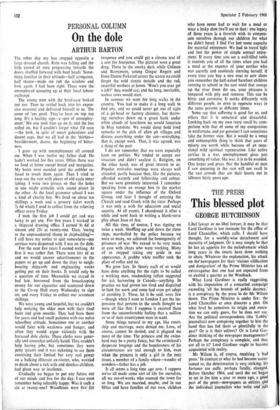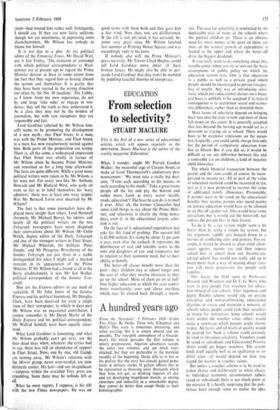This blessed plot
THE PRESS GEORGE HUTCHINSON
Libel lawyer or no libel lawyer, it may be that Lord Gardiner is too innocent for the office of Lord Chancellor, which calls, I should have thought, for a worldly-wise detachment and maturity of judgment. Or it may simply be that he has an appetite for the melodramatic which long years in the courts have done nothing to abate. Whatever the explanation, his attack on the'newspapers for their 'vicious vilification and denigration' of the Prime Minister has an extravagance that one had not expected from so exalted a quarter as the Woolsack.
What Lord Gardiner is really suggesting, with his imputation of a concerted campaign exceeding 'all the bounds of public decency,' is a conspiracy by the press to do Mr Wilson down. The Prime Minister is under fire: the Lord Chancellor at once discerns a plot. On what level he conceives its origin and execu- tion we can only guess, for he does not say. Are the political correspondents (the 'Lobby' journalists) now conspiring together to bite the hand that has fed them so plentifully in the past? Or is it their editors? Or is Lord Gar- diner thinking of the newspaper managements? Perhaps the conspiracy is complete, and they are all in it? Lord Gardiner ought• to become acquainted with reality. Mr Wilson is, of course, receiving 'a bad press.' In contrast to what he had become accus- tomed to, the deterioration is very striking; his fortunes are sadly, perhaps fatally, changed. Before October 1964, and until the rot began to set in for him a year or more ago, a good part of the press:—newspapers as. entities 4nd the individual journalists who write arid edit
them—had treated him rather well. Indulgently, I should say. If they are now fairly uniform, though not yet unanimous, in expressing some disenchantment, Mr Wilson has nobody to blame but himself.
It is not due to a plot. As the political editor of the Financial Times, Mr David Watt,
put it last Friday, The cynicism or contempt with which political correspondents at West- minster are at present apt to regard the Prime Minister derives at least to some extent from the fact that they regard him as having abused the system and themselves. It is partly that they have been steered in the wrong direction too often by the No. 10 machine.' The Lobby, as I know from my own experience, do .not by and large 'take sides' or engage in ven- dettas; they tell the truth as they understand it. As a class they may not be the boldest of journalists, but with rare exceptions they are responsible and fair.- Lord Gardiner (abetted by Mr Wilson him- self) seems to be promoting the development
of a new myth: that Fleet Street, to a man, was with the Prime Minister,-and Fleet Street, to a man, has now treacherously turned against him. Both parts of the proposition -are wrong. There is, all the same, a widespread impression that Fleet Street was wholly in favour of Mr Wilson when he became Prime Minister, and remained so for a long time afterwards. The facts are quite different. While a good many political writers were taken in by Mr Wilson, a lot were not. For every two like Mr Anthony Howard and Mr Richard West, who early on went so far as to label themselves his 'wary admirers,' there was at least one wary sceptic. Was Mr Bernard Levin ever deceived by Mr Wilson?
The fact is that some journalists have dis- played more insight than others. Lord Hartwell (formerly Mr Michael Berry), his editors and nearly all the political writers on the two ,Telegraph newspapers have never disguised their reservations about Mr Wilson. Mr Colin ,Welch, deputy editor of the Daily Telegraph and one of the strongest writers in Fleet Street, 'Mr Michael Wharton, the brilliant 'Peter Simple,' and Mr Peregrine Worsthorne of the Sunday Telegraph are just three in a stable distinguished -for what I might call a marked restraint in its appreciation of the Prime Minister. If Mr Wilson had a friend at all in the Berry establishment, it was Mr Ian Waller, political correspondent of the Sunday Tele- graph.
_Nor are the Express editors in any need of sackcloth. If Mr John Junor of the Sunday Express and his political lieutenant, Mr Douglas Clark, have been deceived for even a single issue of their newspaper, to which in days past Mr Wilson was an occasional contributor, I cannot remember it. Mr Derek Marks of the Daily Express and his political correspondent, Mr Wilfrid Sendall, have been equally clear- eyed.
What Lord Gardiner is lamenting, and what Mr Wilson probably can't get over, are the dear dead days when, whatever the critics had to say, there Was still an abundance. of support in Fleet Street. Now, one by one, old friends are turning -away. Mr Wilson's relations with the Mirror group, never over-cordial, are now distinctly cooler. His last—and not insignificant —outposts within the so-called Tory press are crumbling. Soon there may be nobody left at all.
What he most regrets, I suppose, is his rift ith the two Times newspapers. He was on
good terms with them both and they gave him a fair wind. Now they, too, are disillusioned. If the rift is not yet total, it has certainly be- come very great since Mr Wilson lunched last summer at Printing House Square and was exceedingly rude to his hosts.
If nobody else will, the Prime Minister's press secretary, Mr Trevor Lloyd Hughes, could tell Lord Gardiner more about all these broken fences. He might also be able to per- suade Lord Gardiner that they won't be mended by peddling fanciful theories of conspiracy.



































 Previous page
Previous page